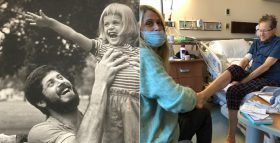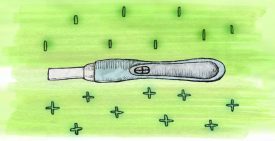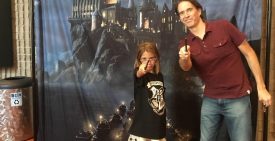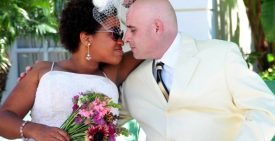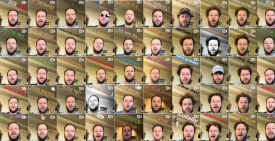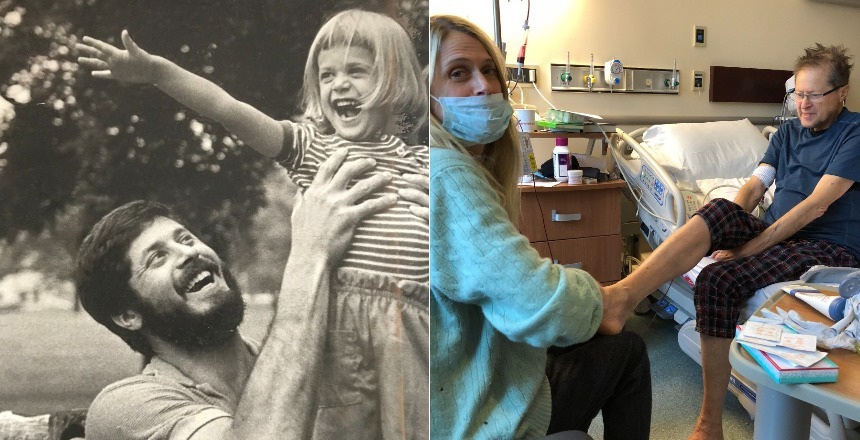
Molly and her dad in Chicago, circa 1982; Molly rubbing his feet in the Bone Marrow Transplant Unit
Dear Dad, hard to believe it’s summer again. Twelve months and twelve moons ago, out of the blue, M. moved out of the house. Then came your fatigue, followed by swollen ankles, abnormal white blood cell counts, all cause for concern. How little we knew of what was to come. That my marriage was broken beyond repair. That your polycythemia vera, latent for twenty years, had converted to acute leukemia overnight. Eighty-five percent chance of surviving the stem cell transplant, Dr. B. told us in August, “and barring no complications,” he said, making marks on a chart, “you will be home by Christmas.” Behind him, the East River glittered.
How important that body of water would become. Four months later, on the last lucid day of your life, you looked out the window, tubes in your nose, struggling for breath. “River of hope, river of desire,” you said. But by then it was December, and the water, cloudy as a cataract, was frozen over in ice.
How horrible, that hospital, holding you hostage. The floor below yours belonged to the babies. Welcome to the world, wee ones! Beaming mothers in wheelchairs sang lullabies to swaddled bundles in the elevator. But your ward, way at the end of the earth, was full of wheezing old ghosts, tangled up in tubes. Catheters and Kleenex. Chemotherapy. Morphine, ministers. Just a few months earlier you were barbecuing bratwursts, holding board meetings, playing basketball with the boys.
Now you were a king among lepers. Your first roommate was pneumatic, necrotic, filled with phlegm. Former banker, father of four, Stern Business School grad turned pile of dinosaur bones. In early September, you were still the picture of perfect health. Two hundred and six pounds. Six foot six, full head of black hair, blue eyes. Striding down the hallways, separated by thin sheets from dying men. But you would never be the dying man, Dad. This I believed. You’d be back on your throne by summer, roasting s’mores and eating sweet corn on the shores of Lake Michigan. 2017, our season of miracles. Fireworks would streak the sky.
Then, one round of chemotherapy turned into two. September became October. Still I believed. Belief. So cruel, so sweet. Like a spoonful of sugar. A few days after your diagnosis a total solar eclipse descended over the city. I stood on Franklin Street, staring at the sky, a child holding each hand. Violet tentacles crackled off the skin of the sun. It was a sun of fairy tales, fables. But yours would be a hero’s journey, Dad. From sickness to health. Darkness to light. Turn your fear into love, a healer told you on the phone.
Your hair began to thin. Bruises appeared on your belly. By Yom Kippur you’d dropped thirty pounds. I saw you from the corner of my eye, a skinny boy in a cap with stick legs in slacks. After services I brought you brisket, but you took two bites and went to bed. I lay down next to you. We sang Kol Nidre under the covers. You asked, “When my brother said goodbye to me last week do they think he thought, ‘I’ll never seen him again?’” I looked out the window. Silver skyline, soaring bird, black bridge. I said, “Maybe.”
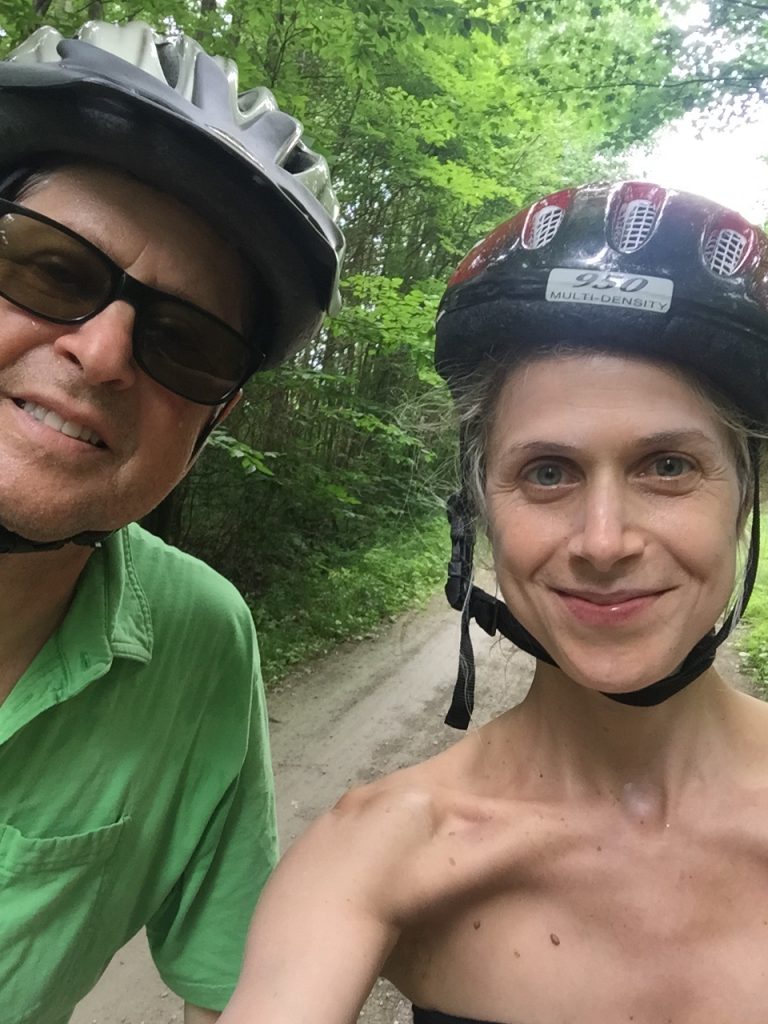
On the Cal Haven Trail in Michigan
But the world is divine when someone you love is dying. A cup of coffee with cream. The snowflake on your coat. Sleeping baby, bathed in sun. A few years ago I asked if you had any stones I could use to make rings. I meant diamonds, emeralds, rubies. You thought for a minutes, said yes, and disappeared into your closet. A few minutes later you returned, handful of pebbles from Lake Michigan in your palm.
You were a Boy Scout. All-Star basketball player. Member of the Air National Guard. First in your family to go to college. Grandpa dropped you off at Brown with tears in his eyes. During the DNC, you stood next to George McGovern, ten floors up, at the Hilton Chicago watching police kick the shit out of hippies holding protest signs in Grant Park. I would have never believed this if I hadn’t seen it with my own eyes, Mcgovern muttered next to you. You met Mom, tied the knot. had kids, cars, dogs. From Buddy Holly and Blue Suede Shoes to guarding the gate at costs, the boys of your generation were taught to suit up, show up, shut up. Buy a house. Bear the load. Family, home, Shabbat Shalom. The maple tree outside our house had roots so strong they raised the sidewalk. But sometimes you’d sit and stare into atlases. You were a licensed pilot who hadn’t taken flight since the sixties. After dinner you’d disappear downstairs, build furniture from driftwood. Favorite books: John Steinbeck’s book “Travels With Charley” and “River Of Doubt” about Teddy Roosevelt’s journey into the jungle. Pilgrim soul turned 24-hour-father; our family mutt was named after Lewis and Clark’s dog. Two days after your birth, May 6th, 1943, Uncle Lew sent this message to your mother via Western Union: Welcome Robert, the world is a little mixed up right now but I know soon everything will be right again when boys like you become men.
You taught me to make a fire. A budget. Pasta from scratch. Play baseball, you said, but I was like: Buzz off. You had a temper. You were tough. I said, “I got the lead in Oliver Twist.” You said, “Good, go take out the garbage.” You were Winston Churchill and Manischewitz; I was Winston cigarettes and rotgut red wine. You told me to study the classics in college, but all I did was drugs and dance. You were compound interest and clean your room and Kristalnacht; I was Kurt Cobain and cocaine and cutting class. But time made you tender. When I was 27, I stood in the kitchen with a knife to my wrist; you flew to New York with chicken soup and chocolate bars. When I was 32, we sat in rocking chairs and watched a lightning storm over Lake Michigan. I said, “I’m sorry I wasn’t always a good daughter.” You said, “I’m sorry I wasn’t always a good dad.” We both cried.
Two rounds of chemo became three. Next, a clinical trial that shrunk your spleen. The doctors were pleased. Transplant was scheduled for mid-December. By then, your body was battered. I sat with you for nine hours in the ER while your nose poured blood. “You’re my rock,” you said as a nurse tucked tampons up your nostrils. One day I texted you a photo of my kids eating popcorn, watching Paddington Bear in their pajamas. “They will always remember this,” you texted back. Words of a man hovering between worlds. On the eighth night of Hanukkah, you received eight million stem cells. We ate chocolate cake and sang “Happy Birthday To You.”
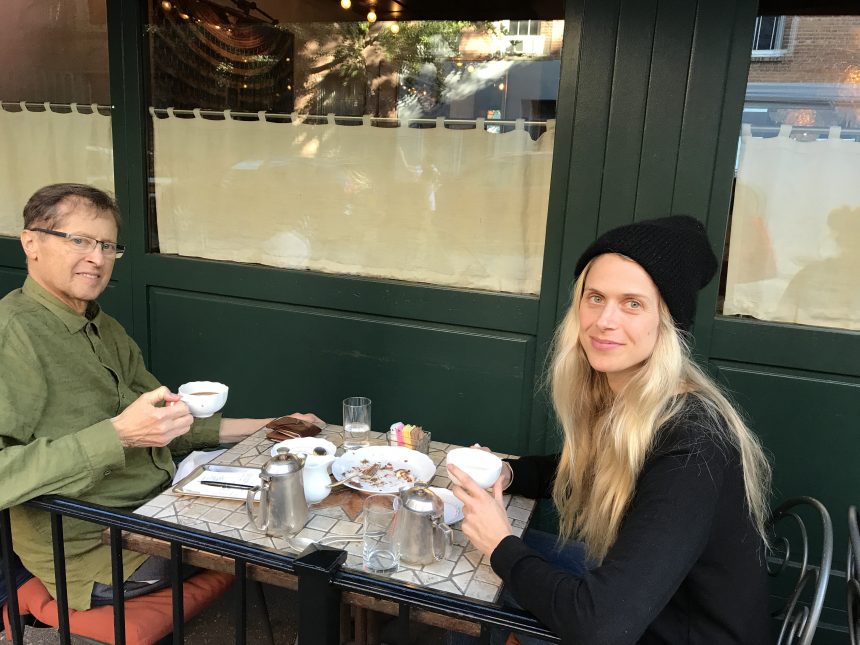
Lunch in New York City’s West Village after chemo
You said things Dads say to daughters when they believe their death is imminent.
You said I was special.
You said I looked like a princess.
You, who had never ruffled my hair or called me sweetheart, said to me one Sunday, “My one wish is that you find a man who loves your exceptional mind as much as I do.”
“What’s this feeling?” I asked a friend the first day it started to snow. “There’s a hollow cold pressure in my stomach. Not like pregnancy. Not like something is growing. Like something’s being pulled away.”
“That,” she said, “is sadness.”
But I’ve never walked through life sad. In all the months my marriage was falling apart, I was not sad. I was furious. I hated the man I had married. The hatred was so pure that it was impossible to feel the sadness inside it. I read a book about an anorexic once. She was thin, scarce. She barely ever ate. An apple, some water. Two carrots, two crackers. But inside she was famished. All day long, all she thought about was food. She was the hungry girl who fooled the world into thinking she never wanted to eat.
Threatened by the absence of your love, my appetite for it became enormous. Me, who spent the first twenty years of my life trying to get away from you, sat and watched you sleep, wearing a rubber gloves and paper robe and plastic mask, scared to leave your side. On Christmas morning you choked on your meds, and I ran out into the hallway, screaming, “Help help my Dad!” and a nurse sauntered into your room, sighing, as if to say: Girl, we see this all damn day. Your room, painted a weary shade of yellow-white, got dark at 4:10 pm, full of dingy December sun that shone weakly through the windows.
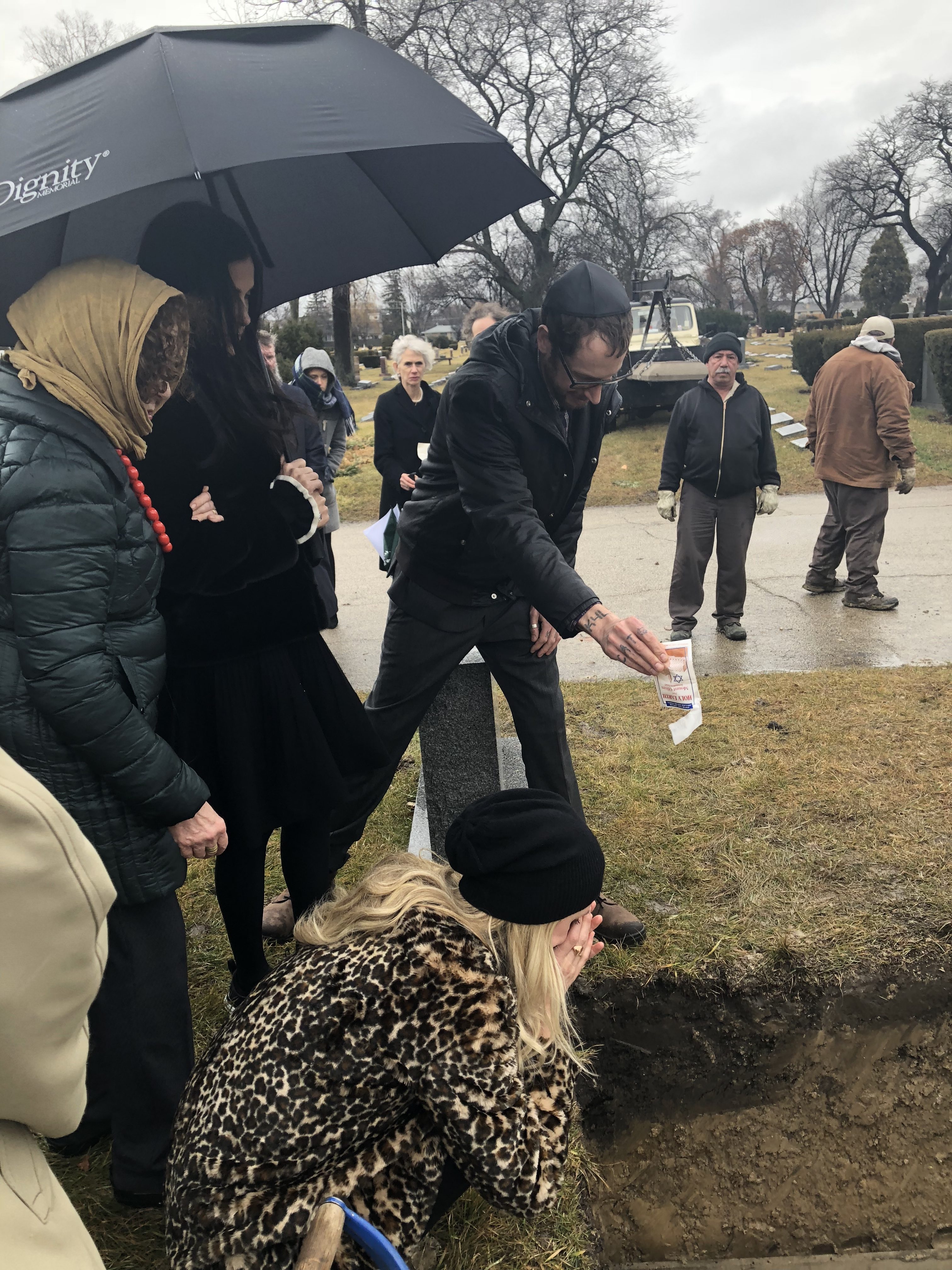
Molly kneeling during her dad’s burial
Sometimes, while you napped, I would recite the Shehecheyanu, your favorite prayer: thank you God for giving us life, sustaining us, and allowing us to reach this season, but afterwards, a Rabbi told me it was wrong prayer to recite, that it’s reserved for once-in-a-lifetime celebrations like births, marriages, and bat mitzvahs, and I felt embarrassed. But, Rabbi, how many times in his life does your father, fallen like a tree, allow his restless spirit to follow the flow of the river, go where the roving and dying collide, wander into the wild with no road map back?
One night, you fell off the bed. And then, atrial flutter. Then came confusion. The next day you couldn’t stop coughing.
Day eleven. December 29th. The nadir. No one prepared us. Everyone prepared us. Day eleven is the hardest, the hematologist had said, but what had we heard? You will be home by Christmas, barring no complications. Imagine the worst flu you’ve ever had, multiplied by ten. But on day twelve your stem cells will start growing. You’ll have brand new bone marrow, rich with blood and oxygen. Outside the ICU window, frozen water reflected stark grey sky. Nurses came and went, whispering bronchoscopy and intubation.
“We’re going to need a bit of luck to get through the New Year,” said Dr. B.
“But I’m almost out of the woods,” you said.
I was watching the snowfall from bed with both kids early the next day when the hospital called. M. was with you, I learned later — while you were slurring and sputtering, tugging on the oxygen mask spitting your pills all over the floor — it was M. who sat by your side. “Do you want me to hold your hand?” he asked, and as you nodded, eyes closed, he grabbed for you, and you gripped onto him, and the blizzard outside, and the doctors rushed in, and the tube descended down your throat, and river of hope, river of desire, we never spoke again.
“Our task must be…to free ourselves by widening our circle of compassion to embrace all living creatures and the whole of nature in its beauty,” wrote Albert Einstein after World War II to a bereaved man whose child died.
At night, while my kids sleep, I stare at the walls replaying that morning in my head. Sometimes I sit with M — a man who long ago left me for a love I could not give him— and make him tell me, minute by minute, how long he held your hand for, how tightly you held his back. In a world without you I have to believe there is room for everyone: the dark and the dazzling, the dying and the living, those in need of food and those who have been fed. On a perfect summer day, the moon slides in front of the sun. I wanted diamonds, you gave me stones.
Molly Rosen Guy, Creative Director of Stone Fox Bride, contributing editor at Vogue and Domino, is author of Love, Lust and Wedding Planning for the Wild at Heart. Follow her grief journey on @mollyrosenguy, where she’s been penning daily letters to her Dad since he died on January 4th, 2018.

